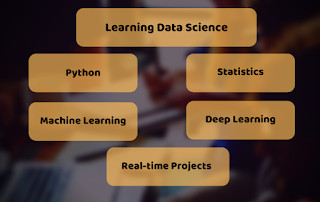How to become a Data Scientist!
This is something which I assume that most of us are coming across lately that "A data scientist is a professional known as the sexiest job of the 21st century". If you are a Data Science enthusiast or if you want to pursue a career in Data Science, it just means that you have to keep on learning and updating.
So, who is a Data Scientist?
A Data Scientist is a professional who works on a large amount of data and can extract insights through them. Data Scientists act as storytellers who communicate with the other professionals working in other domains, as they cannot understand the data terms.
Background needed?
Many of us who want to pursue a career in Data Science, have their doubts that is it really necessary to be from a programming background to get into a career like Data Science. I would rather say no, it is not compulsory that you need to be from a programming background. But you have your basics clear in Math and Statistics.
Is it hard to study Data Science?
Data Science is a broad field that comprises topics like Statistics, Calculus, Data Visualization, etc, but with lots of resources available you can easily start learning these by giving an amount of time and dedication.
So, basically what to learn in Data Science?
Programming: Python and R, are the widely-used programming language for Data Science. Among these two, Python is preferred as it is the general-purpose language and it has the largest community for data analysis. Under Python for Data Science, you should learn Strings, Decision and loop control, Data types in Python, Functions, and Modules, Data Analysis using Numpy and Pandas, Data Visualisation using Python: Matplotlib and Seaborn
Statistics: You have to versed with the basics of probability and inference and understand the concepts of statistical inference. In Data Science, you will have to learn the fundamentals of math and probability, Descriptive Statistics, Inferential Statistics, Hypothesis Testing, Data Processing, and Exploratory Data Analysis.
Machine Learning: Learning applied Machine Learning as it covers the aspect of building a machine learning model from end to end. Under ML you will have to go through Supervised Learning, Linear Regression, Logistic Regression, Decision trees, Unsupervised Learning, Natural language processing, Time Series forecasting, etc.
Deep Learning: After learning machine learning you can get to start learning Deep learning. Under deep learning, you should cover topics like the fundamentals, Neural Networks, Convolutional neural network, etc.
Projects: Projects are an essential part of the whole Data science training. You can make a project portfolio as making a project portfolio is your opportunity to show what all you have done from learning and work experiences. Working on projects will always give you practical experience of the whole thing that you have learned theoretically.
So, once you are done with all the learning that is needed in Data Science. You should overlook on your communication skills. You must be good at your communication skills as you are the one working with data and you understand data well, so you will need to interpret your data findings into quantified insights for a non-technical team to aide in the decision making.
You must be great at Communication Skills as well in order to become an expert Data Scientist! That’s because while you understand the data better than anyone else, you need to translate your data findings into quantified insights for a non-technical team to aide in the decision making. So you should be able to present your data in a format with detailed results and values so that different people can understand what you are interpreting.
Now, we have discussed the skills that are needed to become a Data Scientist. Now there is one foremost thing that you will have to consider, that is Networking!
Networking: It not necessary to have a mentor and be dependent on one, I would rather suggest that you can connect to different spaces wherein you can share your ideas and get to know the opinions and feedback from different people. You can get connected in various forums, where you can ask your problems as well. This is actually needed for everyone who is looking out for new opportunities and those who want to build there network. Try attending various meetups, webinars, and conferences related to data science. You will get to connect with industry specialists which will actually help you with your profile guidance and you can even establish a chance to showcase your project portfolio.
I hope this would be a helpful resource!


Comments
Post a Comment